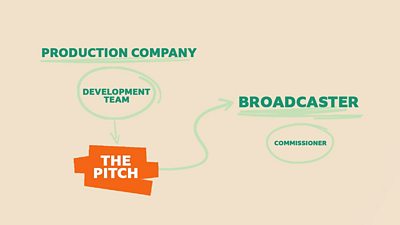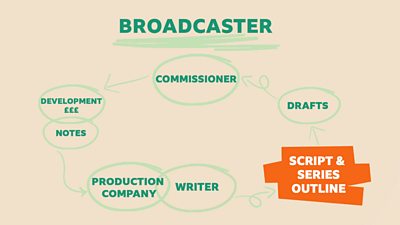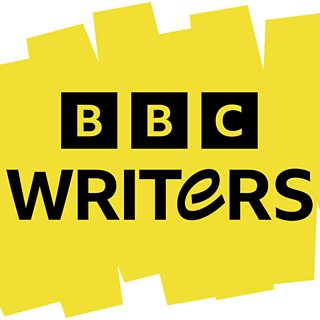The TV industry can be very confusing. For a writer it can feel overwhelming trying to figure out which hoops you need to jump through, and in which order, to get your script into production. You'll also stumble into a few industry-specific terms that might be new to you. Some are explained in this blog post, but if there's something you're not sure about, take a look at our Scriptwriting Glossary.
At ����ý Writers, although we sit within the TV Drama Commissioning department, we don't commission or make TV programmes. This blog post is for writers who are keen to understand more about how to make their project into a reality. (For more about what we do and where we sit within all of this, check out How We Find and Develop Writers and Our place in the ����ý and the television drama landscape.)
If you're a writer with a TV script that you want to get made, this is the second part of a whistle-stop tour of the important checkpoints along the way, and what you need to do to be in a good position to succeed.
Following on from Part One of this short series of blog posts, which covered the journey of your script from Idea to Commissioner, in Part Two we’re going to examine what happens when you get that elusive initial ‘Yes’ from the ����ý TV Drama Commissioning team and how your project (hopefully) moves from their development slate into a production greenlight.
This blog post focuses on the Commissioning process within ����ý TV Drama. The situation may vary to some extent with other broadcasters, but the essentials will remain the same.
The ����ý TV Drama Commissioning department is made up of several teams or ‘pods’ headed up by a Commissioner or Commissioning Editor, many of whom have an additional remit to support independent producers in specific UK Nations and English regions. This is with the aim of helping and supporting the growth of production and talent from outside London, and reflecting the whole nation in the stories that make it to the screen.
Each Drama Commissioner is supported by a Commissioning Coordinator for administrative and editorial tasks as well as a Commissioning Executive. In the nations and north of England these Commissioning Executives are also part of the ����ý Writers core team. This means that the writers who come through ����ý Writers' development schemes already have a strong connection to Drama Commissioning, with the Commissioning Execs having a familiarity with their work. For further information on this relationship check out ����ý Writers - Our place in the ����ý and the television drama landscape
The Pitch

So how does a writer’s work get in front of ����ý Drama Commissioning? ����ý Commissioning will not accept pitches directly from individual writers. All approaches must be made via an Independent Production company (Indie). Writers may have forged a relationship with an Indie through an introduction from a literary agent or they might have been scouted by members of the Indie’s development team, for example from having seen the writer’s work in the theatre or short film. From that point onwards, they might have worked up some ideas with the writer and/or taken an Option on their script or idea/treatment. See From Your Idea to Commissioner for more details.
Once the Indie feel that your work is ready to be sent to ����ý Drama Commissioning, they will contact the relevant Commissioner/Commissioning Editor. This is an ongoing process (rather than via specific date windows) with Commissioner’s inboxes receiving regular and rolling submissions from Indies from across the UK and Republic of Ireland. These submissions can range from a Pitch Document to a Treatment, a Series Outline or a Script depending on the nature of the idea, the size and resources of the Indie and their experience of the best way of selling any particular idea. In other words, whether a script is needed to ‘prove the concept’ of the idea, or this is better done via another means, for example a pitch document. It will also vary depending on the track record of the writer (ideas from high-profile and successful writers will be sought after by multiple broadcasters). These inboxes – as you can imagine – get very full, although the aim is to reply to each submission within eight weeks.
Each submission will be read by the members of the pod who will work up a report to summarise the submission and then share and discuss them all in a pod weekly submissions meeting. Any unsuccessful pitches will be replied to with some feedback for the Indie and writer to take away. The Indie may have pitched the project to several broadcasters and it is not unusual for one broadcaster to ‘pass’ on it (this is not necessarily because the project is lacking in quality, but they may already have another similar one on their slate) only for it to be picked up by another.
If the Commissioning team like your proposal and it fits onto their slate alongside everything else that is already in development, then they will offer the indie a development commission. This means that ����ý Drama will provide the selected Indie with a sum of money to enable them to develop that initial pitch further, often into a Pilot episode script (usually through two to three drafts) and a series outline. Money from the ����ý will not only go towards paying the writer and Indie development team for their work – the contract for which will be negotiated between the Indie and the writer/writer’s agent – but it will also fund necessary aspects of development such as any research, legal fees and travel which the Indie might incur.
All contact between ����ý Drama Commissioning and the writer will be handled through the Indie, but the ����ý will also want to meet and get to know the writer and gain a sense of their vision for the project. The Commissioning team will have regular catch ups on the work, usually at the point of delivery of a new draft of the materials, when they will give notes. If it is a newer writer, then this whole development process may have a much longer running time – to ensure that they are fully supported and get to where they need to be.
It's worth mentioning at this point that, even though a writer might get onto the ����ý Drama development slate, this is still not a guarantee of a project going into production. Sometimes a project may be developed to a point before the Commissioning team decide that it will not go further in the process. If this happens then the project will be put into what is known as ‘turnaround’ which means that the materials will be legally released back to the Indie/writer so that they can do what they want with them, for example taking it to another broadcaster. Sometimes a project can move between different broadcasters before eventually being produced.
The Commissioning Slate

However, the hope is that this development process will go well enough to the point where the Commissioning Editor from the pod will refer the project up to the Director of ����ý Drama who will decide whether to give the project a greenlight. Again, there are multiple factors in play here, for example creating a balanced broadcast output with a range of dramas covering different subjects from different parts of the UK, and that will appeal to different parts of the audience.
If your project is successfully greenlit by the Director of ����ý Drama, that's when the work really starts. That will be when all the roles within the production company come to life, and your project will have all hands-on deck to ensure a lot of moving parts are working simultaneously, within time and budget constraints and with multiple stakeholders to impress. We’ll aim to detail the next steps of the process, and the many people and departments who are working with your script in the next of this series of posts: From Greenlight through Shooting.
Related Links
-
Read Part One: From Your Idea to Commissioner on our blog
-
Find out more about the Commissioning team on the ����ý Commissioning website
-
Scriptwriting Glossary on our Resources pages
